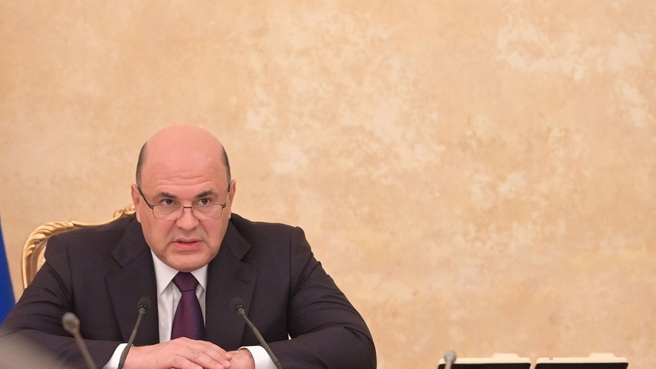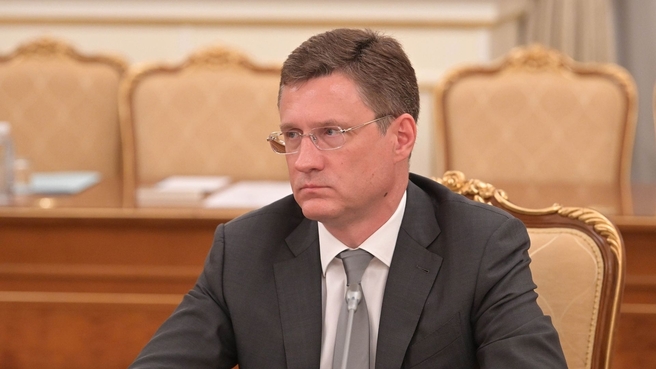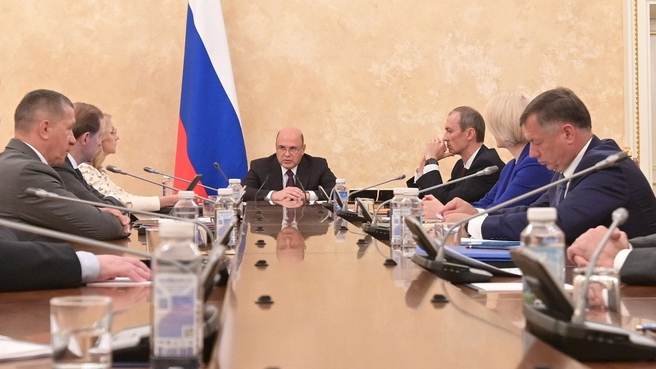Agenda: support measures for the electronics industry, incentives for the export of high-tech products, development of the Northern Sea Route.
Mikhail Mishustin’s opening remarks
Alexander Novak during Mikhail Mishustin’s meeting with deputy prime ministers on current issues
Mikhail Mishustin: Good afternoon, colleagues.
The list of participants in the meeting with deputy prime ministers on current issues, 1 August 2022
Let us begin with support measures for the electronics industry. The production of modern components is the basis of the goal of attaining the technological independence and sovereignty of the country and, therefore, underlies the national development goals set for us by the President.
The decisions adopted by the Government will help us provide additional incentives for the industry’s development and the creation of our own competencies.
The amendments made to the Tax Code in July will allow the Russian electronics companies on the special register, that is, accredited companies, to cut their income tax and insurance payments rates.
In the past, the register only included developers. National producers have been added to the list in order to make the support measures available to a larger number of companies. An important requirement has been introduced that removes foreign-controlled companies from the register. A relevant Government resolution has been signed.
At the same time, we have approved a list of products that will entitle the companies producing them to apply for inclusion in the register. The list includes, in part, computer servers, databanks, information security products, medical equipment electronics, LED bulbs and various telecommunications equipment, that is, everything the public and businesses need.
Tax benefits will also be available to developers of materials and technologies that are used in the manufacturing of electronic components.
Taken together, this will allow us to increase the production of our own electronic products despite the sanctions and, consequently, to enhance their competitiveness.
Another decision is aimed at promoting the export of our high-tech goods. Increasing the export of non-raw materials is a major task set to us by the President.
The Russian economy remains open to all countries that wish to develop partner relations with us. However, our producers and suppliers are facing additional costs and problems amid the sanctions.
To support such companies, the Government will simplify the current procedure for reimbursing up to 80 percent of transportation costs and will more than double these payments from 11 percent to 25 percent of the cost of industrial exports. Nearly 8 billion roubles will be allocated for this purpose under the International Cooperation and Export national project.
Companies no longer need to submit applications in advance, giving the planned export figures or undergo a complex selection process, which was also complicated because of the red tape involved. The necessary documents can be provided after the products are delivered to foreign markets via the My Exports digital platform or in the traditional paper form.
I would like to ask the Ministry of Industry and Trade and the Russian Export Centre to organise work under the new rules, as soon as possible, and it will be effective this year and in 2023, just as we agreed.
The Government continues to develop the Northern Sea Route as a major transport corridor of global significance. It is being used to carry the bulk of deliveries to our northern regions, metals and energy to the global market, as well as transit cargo between Asia and Europe. Since it is located entirely in the territorial waters and the exclusive economic zone of Russia, this is exceptionally important in the context of the current sanctions, which have disrupted logistic chains. It is a reliable sea route that is in great demand for businesses and, of course, for people in the Arctic and the Far East.
The President has pointed out the importance of the uninterrupted delivery of supplies to the people and enterprises in these regions.
As per the President’s instruction, we are establishing the Chief Directorate of the Northern Sea Route. Its main goal will be to organise the transit of vessels, including the issuance and revocation of permits for such operations.
Mr Novak, tell us, please, about the progress of this work.
Alexander Novak: Mr Mishustin, colleagues.
Mr Mishustin, as you have noted, the further development of the Northern Sea Route is a strategic task for our economic growth, because the Arctic zone is a major source of natural resources and the region where about 3 million people are living. In fact, the NSR is a new global transport corridor.
Its priority socioeconomic task is to ensure the delivery of supplies to our Arctic regions. Sea deliveries are a way to cut transportation costs and to supply the necessary consumer goods to people and material supplies and equipment to companies.
Another task is to export products within the framework of the investment projects underway in the Arctic zone, primarily to global markets, and to deliver products that are necessary for the implementation of these projects.
The third task is to carry international transit deliveries between Europe and Asia.
Mr Mishustin, in accordance with your instruction we have drafted a socioeconomic initiative for the year-round operation of the NSR. A coordination centre is working on the implementation of this special project. This comprehensive project will involve various federal executive authorities and the companies that are implementing projects in the Arctic regions. Therefore, the coordination centre is monitoring the situation in the region, the implementation of the projects to which products are being delivered via the NSR, the construction of vessels, including icebreakers, and the port, navigation and rescue infrastructure.
As for the current development of the NSR, freight traffic reached 35 million tonnes in 2021, which is 2 million tonnes or 6 percent over and above the plan. As of July this year, the year-end increase will be 5 percent.
The volume of transit cargo has increased threefold over the past two years. The number of vessel movements via the NSR has doubled to 1,627. This is evidence of the growing demand for the NSR services.
The President has set the task of increasing freight traffic on the NSR to 80 million tonnes in 2024. According to the companies that plan to transport their cargo via the NSR, the traffic might reach 200 million tonnes by 2030.
This is connected first of all with the implementation of the Novatek’s LNG projects, Rosneft and Gazprom Neft’s oil production projects, the construction of the Baimsky mining and processing plant (GOK) in Chukotka, and Norilsk Nickel’s plans to increase production.
Our GDP is expected to increase by about 30 trillion roubles thanks to these projects by 2030, and tax payments are expected to grow by over 10 trillion roubles.
Of course, to attain these transportation figures we need to expand the infrastructure along the entire Northern Sea Route.
The President and you have formulated the task of infrastructure development. We are working to fulfil it. I would like to report that over the past two years we have increased the number of icebreakers from four to six. Our fleet has two of the world’s most powerful icebreakers now, the 60MW Arktika and Sibir.
In addition, another four icebreakers are under construction in Russia, three at the Baltic Shipyard in St Petersburg and one at the Zvezda Shipyard in the Primorye Territory. The first one is to be completed in late 2022, and the other three in 2024, 2026 and 2027.
Since three of our icebreakers will be decommissioned soon, there are plans to build another six icebreakers by 2030. Four will be financed with extra-budgetary funds, and two icebreakers and one recharging ship will be funded from the budget.
Mr Mishustin, I would like to thank you for supporting us in this matter. We have reported to you on this before.
I would also like to say that we are completing the construction of the Utrenny terminal as part of port infrastructure development. We have started building the Bukhta Sever port and the Yenisei coal terminal and are preparing for the construction of the Naglyoinyn port in Chukotka. Last year we widened the sea channel in the Gulf of Ob for large-capacity vessels.
In accordance with our infrastructure development plans, transhipment capacity should increase from 32 million tonnes now to 80 million tonnes by 2024. Despite the difficulties, all the infrastructure projects are proceeding as planned. We are working to increase freight traffic volumes to reach our goals, giving priority attention to the development of the rescue infrastructure of the NSR and the Arctic satellite group for weather and ice forecasting, communication and internet connection, on which we are working jointly with our colleagues from the Emergencies Ministry and Roscosmos.
Mr Mishustin, as you pointed out, this year amendments have been made, as per your instructions, to the federal law on Rosatom and to the Merchant Shipping Code. They are designed to improve the interoperability of departments and services, increase their efficiency, and centralise control of the NSR. Rosatom is now fully responsible for shipping along the Northern Sea Route.
Rosatom is establishing the Chief Directorate of the Northern Sea Route, which will incorporate the Marine Operations Headquarters. You signed a resolution to this effect. This will ensure safe transport along the NSR and stable delivery of goods to the northern regions and will attract new transit carriers to the NSR.
Mr Mishustin, these are major and complex tasks, and we will definitely need to continue working to develop this strategic transport corridor in accordance with the decisions the President and you have adopted.
Mikhail Mishustin: Thank you.
It is very important to fulfil all our plans and to balance our resources, including budgetary funds, and the investment programmes we discussed. I am referring mainly to the decisions we have taken on balancing the icebreaker construction programme, including those that are to be financed from the federal budget.
I have a request for you: as we agreed, the necessary allocations must be coordinated before we make amendments to the federal budget and formulate a three-year budget. This also concerns a large number of investment projects. For example, you mentioned the Baimsky GOK. I believe we need four such blocks. There was a harbour wall and a road. We also discussed waste removal with Rosatom. There are many issues we need to coordinate and settle.
Mr Novak, as we agreed, you will be personally responsible and will monitor all these interdepartmental aspects of NSR development. As I said, these are related issues.
Please, see to all these issues personally.















